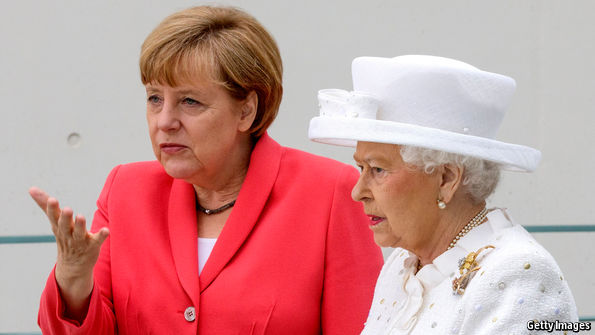Welcome to DU!
The truly grassroots left-of-center political community where regular people, not algorithms, drive the discussions and set the standards.
Join the community:
Create a free account
Support DU (and get rid of ads!):
Become a Star Member
Latest Breaking News
General Discussion
The DU Lounge
All Forums
Issue Forums
Culture Forums
Alliance Forums
Region Forums
Support Forums
Help & Search
Religion
Related: About this forumGerman politicians are both more and less religious than British ones

Jan 7th 2016, 11:14
by ERASMUS
ANGELA MERKEL, who grew up in communist East Germany as the daughter of a Lutheran pastor, is a "serious Christian" whose faith is mostly kept "thoroughly private", although every so often she can surprise people with public statements about her personal creed. (For example, she said in an interview in 2012 that "we Christians should not be afraid of standing up for our beliefs."
Nothing too surprising about that conclusion, but the essay opens teasingly by asking whether Mrs Merkel's religious life can usefully be compared to two British prime ministers who said they were strongly guided by Christian belief, Tony Blair and Margaret Thatcher. Her political profile, at least, has points in common with both Britons. Like Lady Thatcher, Mrs Merkel is a woman with scientific training who rose to the top of a centre-right party despite a background that was neither privileged nor well-connected. Like Mr Blair, she guided her party towards the political centre, studying the public mood closely and borrowing policies from her opponents.
But the leaders' religious styles have certainly been different. Lady Thatcher, raised in an ethos of industrious Methodism, saw religion as as inspiration to work and self-improvement; the Biblical Good Samaritan, she pointed out, was only able to help his stricken neighbour because he had a bit of money. Mr Blair (who converted to his wife's Catholic allegiance after leaving office, while remaining liberal on touchstone ethical issues) had to be kept in check by his prime ministerial minders whenever his zealous but idiosyncratic faith came to the surface. Religion seemed to make him more sure of himself, not more humble. Their successor, David Cameron, was meeting Mrs Merkel today: he has played to the patriotic gallery by stressing Britain's cultural inheritance as a Christian country, while acknowledging that his own faith comes and goes, like the reception of an erratic radio signal. So the chances are that they didn't pray together.
Mrs Merkel's periodic professions of faith, as the essay notes, have been trenchant enough and yet carefully non-confrontational. Although she heads a Christian Democratic party, she has generally avoided suggesting that Christianity has specific political consequences, and hence avoided implying that people with different political views are less good in the sight of God, or less good in any sense. In that 2012 interview, she called herself "a member of the evangelical church" who "believe[d] in God" and for whom faith was a "constant companion". But her most frequently quoted religious pronouncement was a statement to her party faithful that "we don't have too much Islam, we have too little Christianity, we have too few discussions about the Christian view of mankind."
http://www.economist.com/blogs/erasmus/2016/01/germany-britain-and-religion
InfoView thread info, including edit history
TrashPut this thread in your Trash Can (My DU » Trash Can)
BookmarkAdd this thread to your Bookmarks (My DU » Bookmarks)
0 replies, 566 views
ShareGet links to this post and/or share on social media
AlertAlert this post for a rule violation
PowersThere are no powers you can use on this post
EditCannot edit other people's posts
ReplyReply to this post
EditCannot edit other people's posts
Rec (3)
ReplyReply to this post